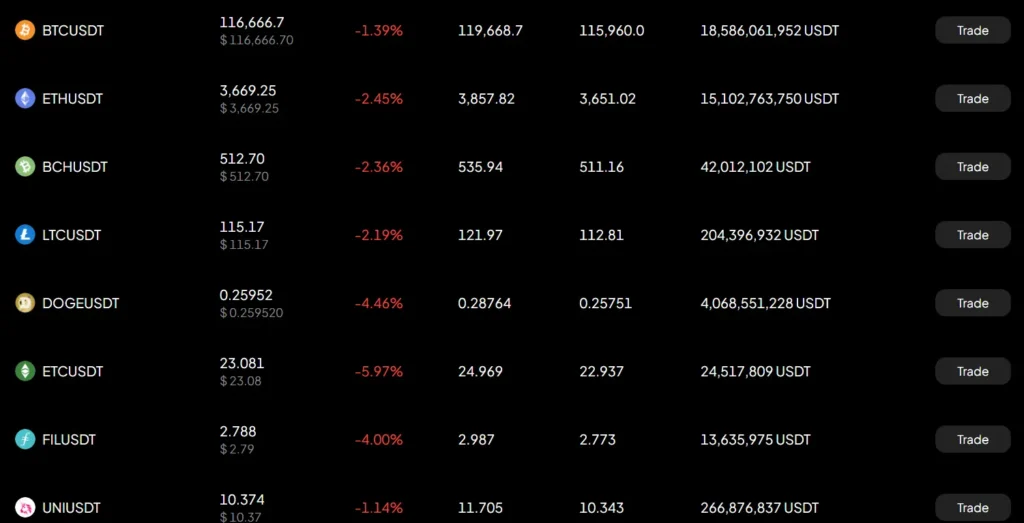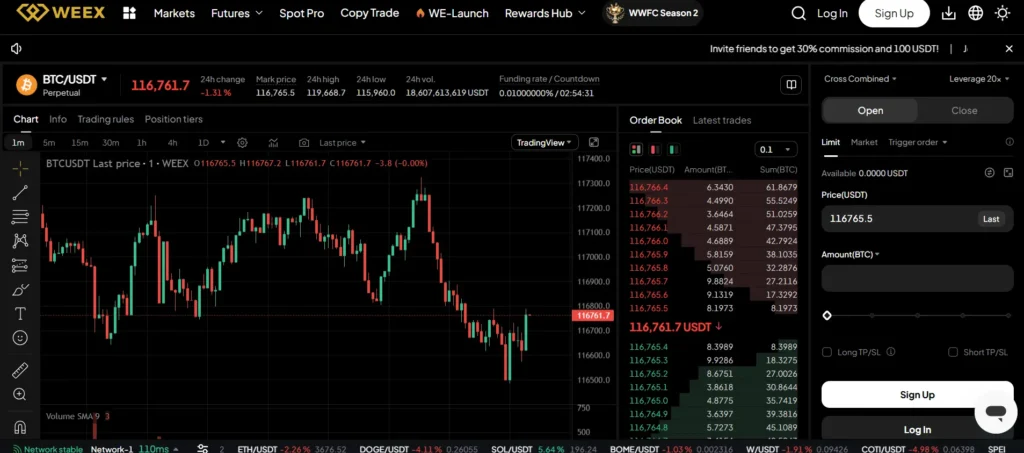With the explosive growth of crypto trading, choosing the right exchange can make or break your trading experience. Whether you’re a beginner looking for a smooth on-ramp into crypto or an advanced trader chasing high-leverage derivatives, the platform you pick plays a huge role in your success.
Two platforms that have gained significant traction in recent times are Weex and Bitget. Both offer powerful features, competitive fees, and a growing user base—but they cater to different types of traders in subtle yet important ways.
In this blog post, we’ll break down everything you need to know about Weex and Bitget—from trading fees, leverage, and supported coins, to their product offerings, security features, and KYC policies. By the end, you’ll have a clear sense of which platform aligns best with your goals, risk appetite, and trading style.
Let’s dive into the ultimate comparison: Weex vs Bitget.
Quick Feature Comparison: Weex vs Bitget
| Feature | Weex | Bitget |
|---|---|---|
| Founded | 2018 | 2018 |
| Founder(s) | Led by Peter and ex-Wall Street team | Operated under Bitget Holdings Pte Ltd |
| Supported Coins | 600+ | 1,300+ |
| Daily Trading Volume | ~$400 million (primarily derivatives) | Among top globally (derivatives-heavy) |
| Trading Fees (Spot) | 0.10% maker / 0.10% taker | 0.10% maker / 0.10% taker |
| Trading Fees (Futures) | 0.02% maker / 0.08% taker | 0.02% maker / 0.06% taker |
| Maximum Leverage | Up to 200× | Up to 125× |
| Deposit Methods | Crypto, Cards, Bank Transfer, Alipay, PayPal | Crypto, P2P, Bank Transfer (region-dependent) |
| Withdrawal Methods | Crypto withdrawals, fast processing | Crypto withdrawals, fiat options post-KYC |
| Security Measures | Cold wallet storage, 1,000 BTC insurance fund, 2FA | 2FA, anti-phishing codes, platform risk control |
| KYC Requirement | Optional for basic use, needed for higher limits | Mandatory for full features, some limited use without |
Weex vs Bitget: Key Differences at a Glance
While both Weex and Bitget were founded in 2018 and specialize in crypto derivatives, they cater to slightly different trader profiles. Bitget offers a broader range of cryptocurrencies, with over 1,300 tokens compared to Weex’s 600+, making it more appealing to altcoin enthusiasts. In terms of fees, both platforms charge 0.10% for spot trading, but Bitget has a marginal edge in futures with a lower taker fee of 0.06% versus Weex’s 0.08%.
Leverage is where Weex stands out, offering up to 200× on select contracts, making it attractive to high-risk, high-reward traders. Bitget, with a maximum leverage of 125×, provides a more balanced approach. The user experience also differs: Weex is designed for pro traders who prioritize execution speed and precision, while Bitget caters to a wider audience, offering copy trading, passive income tools, and a larger ecosystem. Overall, Weex is best suited for seasoned derivatives traders, whereas Bitget is ideal for users looking for variety, community features, and ease of use.
Weex vs Bitget: Platform Products and Services Overview
Weex focuses heavily on delivering a professional-grade experience for derivatives traders. The platform offers high-leverage perpetual futures, a streamlined spot trading interface, and a growing copy-trading ecosystem. It also provides real-time risk metrics, alerts for funding rates, and API access for algorithmic trading. While its ecosystem is narrower than some competitors, it prioritizes depth, speed, and trading performance over feature bloat.
Bitget, on the other hand, has built a much broader ecosystem that caters to both casual and advanced traders. In addition to spot and futures trading, Bitget offers copy trading for both markets, margin trading, launchpad access, savings products, staking, and even crypto loans. It also integrates with Web3 wallets and provides structured investment tools, making it a well-rounded platform for users seeking more than just trading functionality.
Weex vs Bitget: Range of Tradable Contracts
Weex primarily supports USDT-margined perpetual futures contracts, offering high leverage and deep liquidity on major pairs. It focuses on speed and low slippage, making it a strong choice for high-frequency or precision-based trading strategies. The simplicity of its contract offerings—combined with its clean execution—makes it ideal for traders who want to focus exclusively on high-leverage trading without navigating complex product menus.
Bitget offers a more diverse set of contract types, including USDT-margined, Coin-margined, and even USDC-margined futures. This flexibility allows traders to manage collateral more efficiently or take advantage of specific market movements. Bitget also integrates copy trading directly into its futures markets, enabling users to follow high-performing traders without needing to manually manage every trade themselves.
Weex vs Bitget: Supported Cryptocurrencies and Trading Pairs

When it comes to the number of listed assets, Bitget is the clear leader, supporting over 1,300 cryptocurrencies across both spot and futures markets. This includes a wide range of altcoins, meme coins, DeFi tokens, and newly launched assets, giving users ample opportunities for diversification and early entries.

Weex supports a respectable 600+ cryptocurrencies, but its focus is more on quality than quantity. The platform ensures deep liquidity and stable performance on major pairs like BTC/USDT and ETH/USDT. While its selection may not be as expansive, it’s more curated, which may appeal to traders who focus on high-volume, established assets rather than low-cap tokens.
Weex vs Bitget: Leverage and Margin Trading
Weex stands out for its extremely high leverage—up to 200× on certain futures contracts. It offers both isolated and cross margin modes, allowing traders to manage risk in a way that suits their strategies. This high-leverage environment is suited for seasoned traders who understand the risks and rewards of amplified exposure.
Bitget also offers leverage, up to 125× on major pairs, which is more than sufficient for most traders. What sets Bitget apart is its seamless integration between margin, spot, and copy trading. Users can easily switch trading modes, access flexible margin options, and even automate strategies using bots or by copying successful traders. While the leverage is slightly lower, the ecosystem makes up for it with its flexibility and ease of use.
Weex vs Bitget: Trading Volume and Liquidity
Trading volume is a key indicator of an exchange’s reliability and trade execution quality. Bitget consistently ranks among the top global exchanges in terms of daily derivatives volume, with billions traded across its USDT and coin-margined contracts. Its large user base contributes to high liquidity, ensuring minimal slippage even for large orders.
Weex, though newer and more niche, has seen impressive growth in futures trading volume, particularly in Asia. While its overall volume is lower than Bitget’s, Weex maintains strong liquidity on its core pairs like BTC/USDT and ETH/USDT. For most users, especially those trading mainstream assets, both platforms offer smooth execution. However, Bitget holds an edge when it comes to altcoin liquidity and institutional-grade volumes.
Weex vs Bitget: Fee Structure Comparison
Both exchanges follow a maker-taker model for trading fees. Weex charges a flat 0.10% fee for spot trades and 0.02% maker / 0.08% taker fee for futures. Occasionally, it offers zero-fee promotions on selected pairs. Bitget mirrors these spot trading fees (0.10% maker/taker) but slightly improves on futures with a lower taker fee of 0.06%.

Bitget also provides tiered discounts based on trading volume and offers additional savings when using its native token, BGB, to pay fees. Withdrawal fees vary by asset on both platforms, but are generally in line with industry standards. Overall, fee structures are competitive on both platforms, though active traders may benefit more from Bitget’s reward programs and tiered pricing.
Weex vs Bitget: Deposits, Withdrawals, and Payment Methods
Weex supports a variety of deposit methods including cryptocurrencies, bank transfers, debit/credit cards, and even platforms like Alipay and PayPal in supported regions. Withdrawals are crypto-based and typically processed quickly, with security checks in place. Fiat support is more limited and may depend on regional partners.
Bitget offers a similar range of crypto deposit options and supports fiat purchases via third-party providers. Fiat withdrawals, however, may require KYC verification. Bitget also provides peer-to-peer (P2P) trading for users who prefer direct fiat-to-crypto exchanges. Both platforms offer smooth and reliable transactions, but Bitget provides more options for users looking to buy or sell crypto with local currency.
Weex vs Bitget: Native Exchange Tokens
Bitget’s native token, BGB, plays a central role in its ecosystem. It offers trading fee discounts, staking rewards, and access to exclusive features like launchpads and VIP tiers. BGB is frequently integrated into promotions and continues to gain utility within the platform.
Weex does not currently have a widely known native exchange token. This may simplify the trading experience for users who prefer not to manage platform-specific assets, but it also means Weex traders miss out on potential fee discounts or loyalty benefits. For users who value platform incentives, Bitget’s tokenized ecosystem is more rewarding.
Weex vs Bitget: KYC Requirements and Account Limits
Both Weex and Bitget allow users to register and begin trading with minimal initial verification, but full access to platform features requires KYC (Know Your Customer) verification. On Weex, users can trade with limited functionality without completing KYC, but to unlock higher withdrawal limits and fiat-related services, identity verification is necessary. Verified users benefit from faster transaction processing and added security layers.
Bitget also offers a tiered KYC structure. Basic accounts can perform limited trading and deposits, but withdrawals and fiat operations require identity verification. Completing KYC increases daily withdrawal limits and grants access to advanced tools like copy trading, launchpad participation, and fiat on/off ramps. Bitget’s KYC process is straightforward and typically completed within 24 hours, making it accessible even to newer users.
Weex vs Bitget: User Interface and Ease of Use

Weex provides a clean, performance-oriented trading interface that feels tailored to professional traders. The layout is minimal, execution is fast, and charts are responsive. Its mobile app mirrors the desktop experience well, offering full functionality including futures trading, alerts, and copy trading. However, beginners may find the lack of visual handholding a bit steep at first.

Bitget strikes a balance between simplicity and depth. Its UI is modern and well-organized, suitable for both new and experienced users. Features like copy trading and spot-to-futures transitions are intuitive, while the mobile app is polished and user-friendly. Bitget’s interface is especially welcoming for traders trying out advanced tools like AI bots or strategy copying for the first time.
Weex vs Bitget: Order Types Supported
Weex supports a solid set of core order types including market, limit, stop-limit, and stop-market orders, primarily focused on futures and spot markets. These cover the essential needs of most active traders and allow for basic risk management strategies. The platform also allows quick switching between isolated and cross margin modes, giving users more control over leverage exposure.
Bitget provides a broader selection of order types. In addition to the standard ones, it supports trailing stops, take-profit/stop-loss pairs, and iceberg orders. These tools are especially useful for managing large positions or automating exits in volatile markets. Bitget’s variety of order types makes it a better fit for traders who employ complex or algorithmic strategies.
Weex vs Bitget: Security Features and Practices
Both platforms place a strong emphasis on user security. Weex uses cold wallet storage for the majority of user funds, two-factor authentication (2FA), and a dedicated risk control team to monitor suspicious activity. It also maintains an insurance fund reportedly backed by 1,000 BTC to cover extreme market events or unexpected platform issues.
Bitget implements a similar multi-layered security approach. It uses cold storage for the bulk of its assets, mandatory 2FA for withdrawals, anti-phishing codes, and active risk monitoring systems. The platform has not experienced any major breaches in recent years, which adds to its credibility. While both platforms are secure, Bitget’s long-standing global presence and proactive transparency on user protection offer a slight edge.
Weex vs Bitget: Insurance Funds
Insurance funds play a critical role in protecting users from unexpected losses due to extreme market volatility or counterparty defaults. Weex maintains a substantial insurance fund, reportedly backed by 1,000 BTC, specifically designed to cover liquidation losses during high-leverage trading. This gives professional traders additional confidence when operating with aggressive positions.
Bitget also operates an insurance fund to safeguard its users, particularly in the futures market. While the exact size of its fund isn’t always publicly disclosed, Bitget has emphasized its use to prevent auto-deleveraging during sharp market moves. Both platforms use these funds to manage risk in volatile conditions, but Weex is more transparent about its fund’s composition, which may appeal to traders seeking greater assurance.
Weex vs Bitget: Customer Support
Customer support is another area where both platforms have made notable investments. Weex offers 24/7 live chat, email support, and an in-app help center. Its response times are generally quick, and its support is focused on resolving trading-related issues efficiently. However, localized language support may be limited depending on the region.
Bitget, benefiting from a larger global user base, offers multi-language support through live chat, email, ticketing systems, and a robust help center. It also provides educational resources, video tutorials, and an active presence on social platforms. Overall, Bitget edges ahead in support scalability and global accessibility, particularly for users outside Asia.
Weex vs Bitget: Regulatory Compliance
Regulatory clarity is becoming increasingly important in crypto, and both Weex and Bitget have taken steps to comply with evolving standards. Weex currently operates with a degree of regional flexibility, targeting markets in Asia, LATAM, and the Middle East. While it does not yet hold major global licenses, it enforces internal KYC and AML policies and is gradually expanding its compliance footprint.
Bitget, in contrast, has made more proactive moves in regulatory alignment. It has acquired licenses or registrations in several jurisdictions and adheres to regional compliance requirements. Bitget’s operations are more transparent in terms of legal structure and licensing, which may be reassuring to users in highly regulated environments. For compliance-focused traders or institutional users, Bitget currently offers a more mature regulatory posture.
Conclusion
Both Weex and Bitget are powerful platforms, but they serve slightly different purposes. Weex is tailored for high-leverage traders who value execution speed, minimal latency, and professional-grade futures trading. Its streamlined experience and transparent insurance fund make it a great choice for seasoned market participants.
Bitget, on the other hand, is a more well-rounded exchange. With support for over 1,300 coins, a wide range of trading products, integrated copy trading, and strong global support, it’s better suited for users seeking both depth and versatility. Whether you’re a beginner looking for ease of use or an experienced trader who wants to diversify across spot, futures, and DeFi features—Bitget provides a more complete trading ecosystem.
In short, if you’re a derivatives-focused trader who values simplicity and leverage, go with Weex. If you’re looking for a broader feature set and a globally recognized platform, Bitget is the better choice.


